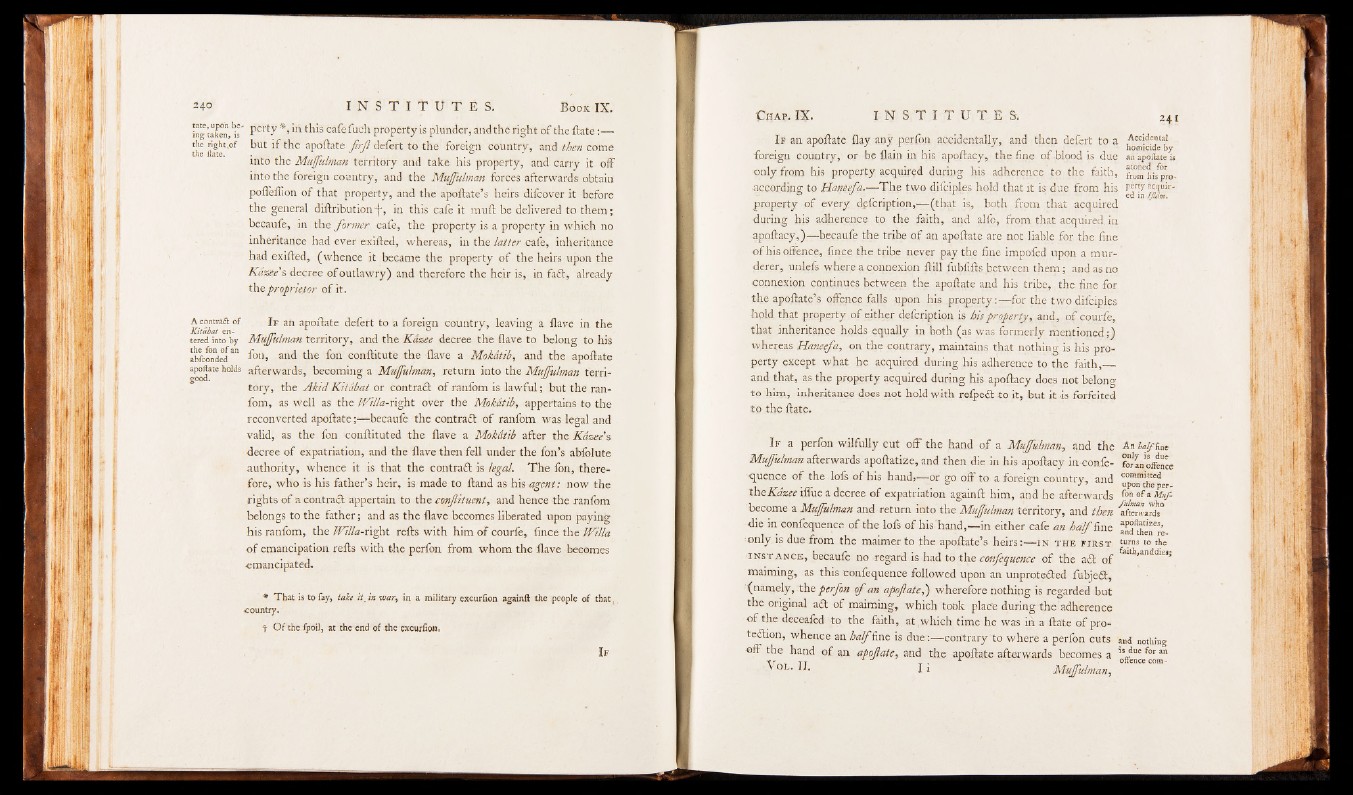
tate, upon be-
ing taken, is
the right.of
the ftate.
A contract of
Kit abat entered
into by
the fon o f an
abfconded
apoltate holds
£00d.
perty Sj in this cafe fuch property is plunder, and the right of the ftate:—
but if the apoftate jir ji defert to the foreign country, and then come
into the Mufulman territory and take his property, and carry it off
into the foreign country, and the Mujfulman forces afterwards obtain
pofleflion of that property, and the apoftate’s heirs difcover it before
the general diftribution"j“, in this cafe it mull be delivered to them;
becaufe, in the former cafe, the property is a property in which no
inheritance had ever exifted, whereas, in the latter cafe, inheritance
had exifted, (whence it became the property of the heirs upon the
Kdzee s decree of outlawry) and therefore the heir is, in fadl, already
the proprietor of it.
I f ah apoftate defert to a foreign country, leaving a Have in the
Mujfulman territory, and the Kazee decree the Have to belong to his
fon, and the fon conftitute the {lave a Mokdtib, and the apoftate
afterwards, becoming a Mujfulman, return into the Mujfulman territory,
the A h d Kitdbat or contract of ranfom is lawful; but the ran-
fom, as well as the Willa-xvfit over the Mokdtib, appertains to the
reconverted apoftate;— becaufe the contract of ranfom was legal and
valid, as the fon conftituted the flave a Mokdtib after the Kazee’s
decree of expatriation, and the flave then fell under the fon’s abfolute
authority, whence it is that the contract is legal. The fon, therefore,
who is his father’s heir, is made to ftand as his agent: now the
rights of a contract appertain to the conftituent, and hence the ranfom
belongs to the father; and as the flave becomes liberated upon paying
his ranfom, the Willa-right refts with him of courfe, lince the Willa
o f emancipation refts with the perfon from whom the flave becomes
emancipated.
* T h a t is to fay, take it in war, in a military cxcurf.on again!! the people o f that,
country.
t O f the Jpoil, at the end of the excurfion.
I f
If an apoftate flay any perfon accidentally, and then defert to a
. 1 ........ , ' homicide by
foreign country, or be flam in his' apoftacy, the fine of blood is due an apoltate is
only from his property acquired during his adherence to the faith, fromblplo-
■ aceording to Haneefa.— The two difciples hold that it is due from his Perty acquir-
6 ' . . ■ ' ' r \ ’ ' eiinljlam.
property of every dpfcnption,— (thft: is, both from that acquired
during his adherence to the faith, and alfo, from that acquired, in
apoftacy,)— becaufe the tribe of an apoftate are not liable for the fine
o f his offence, fince the tribe never pay the fine impofed upon a murderer,
unlefs where a connexion ftill fubfifts between them ; and as no
connexion continues between the apoftate and his tribe, the fine for
the apoftate’ s offence fallj upon his .property:— for the two difciples
hold that property of either defeription is his property, and, of courfe,
that inheritance holds equally in both (as was formerly mentioned;)
whereas Haneefa, on the contrary, maintains that nothing is his property
except what he acquired during his adherence to the faith,_
and that, as the property acquired during his apoftacy does not belong
to him, inheritance does not hold with refpedt to it, but it -is forfeited
to the ftate.
If a perfon wilfully cut off the hand of a Mujfulman, and the An U /Ut
Mujfulman afterwards apoftatize, and then die in his apoftacy in confe- fbr anoff««
quence of the lofs of his hand,— or go off to a foreign country, and coramUt'd
, 0 1 upon the perxheKazee
iilue a decree of expatriation agamn: him, and he afterwards Mu/-
become a Mujfulman and return into the Mufulman territory, and then ^ftenvarfT
die in confequence of the lofs of his "hand,— in either cafe an h a lf fine ^dAen“ ’
only is due from the maimer to the apoftate’s heirs:—-i n t h e f i r s t turns t0
i n s t a n c e , becaufe no regard is had to the confequence of the aft of
maiming, as this confequence followed upon an unprotected fubjedt,
(namely, the perfon o f an apojlate,) wherefore nothing is regarded but
the original adt of maiming, which took plac'e during the adherence
o f the deceafed to the faith, at,which time he was in a ftate of pro-
tedtion, whence an halfimc h due:— contrary to where a perfon cuts and nothing
•off the hand of an apoftate, and the apoftate afterwards becomes a ” due *°r an
\ ol. II. 1 1 Mujfulman,